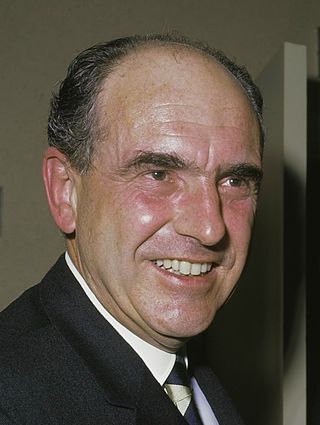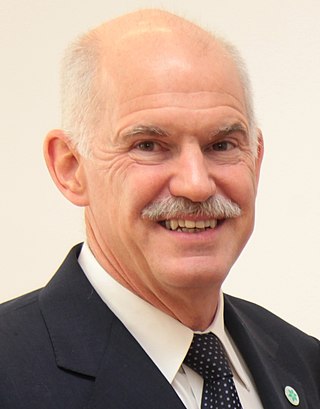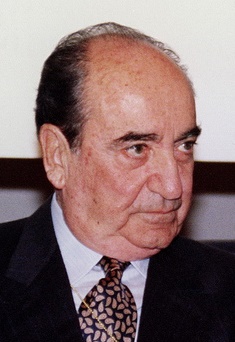| |||||
| Decades: | |||||
|---|---|---|---|---|---|
| See also: | Other events of 1982 List of years in Greece | ||||
Events in the year 1982 in Greece.
| |||||
| Decades: | |||||
|---|---|---|---|---|---|
| See also: | Other events of 1982 List of years in Greece | ||||
Events in the year 1982 in Greece.

Andreas Georgiou Papandreou was a Greek economist, politician, and a dominant figure in Greek politics, known for founding the political party PASOK, which he led from 1974 to 1996. He served three terms as the 3rd and 8th prime minister of Greece.

George Andreas Papandreou is an American-born Greek politician who served as Prime Minister of Greece from 2009 to 2011. He is currently serving as an MP for Movement for Change.

Georgios Papandreou was a Greek politician, the founder of the Papandreou political dynasty. He served three terms as prime minister of Greece. He was also deputy prime minister from 1950 to 1952, in the governments of Nikolaos Plastiras and Sofoklis Venizelos. He served numerous times as a cabinet minister, starting in 1923, in a political career that spanned more than five decades.

Constantine G. Simitis is a Greek retired politician who led the 'Modernization' movement of Greece. He succeeded in leadership Andreas Papandreou, the founder of the Panhellenic Socialist Movement (PASOK), and served as Prime Minister of Greece from 1996 to 2004.

The Panhellenic Socialist Movement, known mostly by its acronym PASOK, is a social-democratic political party in Greece. Until 2012 it was one of the two major parties in the country, along with New Democracy, its main political rival. After a decade of poor electoral outcomes, PASOK has retained its position as one of the main Greek political parties and is currently the third largest party in the Greek Parliament.
Papandreou is a Greek surname. It is the surname of:

Parliamentary elections were held in Greece on 7 March 2004. The New Democracy Party of Kostas Karamanlis won the elections, ending eleven years of rule by PASOK. PASOK was led into the elections by George Papandreou, who succeeded retiring Prime Minister Costas Simitis as party leader in February.

Konstantinos Mitsotakis was a Greek politician who was Prime Minister of Greece from 1990 to 1993. He graduated in law and economics from the University of Athens. His son, Kyriakos Mitsotakis, was elected as the Prime Minister of Greece following the 2019 Greek legislative election.
Parliamentary elections were held in Greece on Sunday, 18 October 1981. PASOK, led by Andreas Papandreou, faced New Democracy, led by Georgios Rallis. Papandreou achieved a landslide and PASOK formed the first socialist government in the history of Greece.
The terms Apostasia or Iouliana or the Royal Coup are used to describe the political crisis in Greece centered on the resignation, on 15 July 1965, of Prime Minister Georgios Papandreou and subsequent appointment, by King Constantine II, of successive prime ministers from Papandreou's own party, the Centre Union, to replace him. Defectors from the Center Union were branded by Papandreou's sympathizers as Apostates ("renegades"). The Apostasia heralded a prolonged period of political instability, which weakened the fragile post-civil war order, and ultimately led to the establishment of the military regime in April 1967.

The nations of Greece and Mexico established diplomatic relations in 1938. Early Greek migration to Mexico contributed to the industrial agricultural development of the North-Western Pacific state of Sinaloa. Both nations are members of the Organisation for Economic Co-operation and Development and the United Nations.

The Maximos Mansion has been the official seat of the Prime Minister of Greece since 1982. It is located in downtown Athens, Greece, near Syntagma Square.

Eva Asderaki, also known by her married name Eva Asderaki-Moore, is a Greek tennis umpire, who has umpired international tennis matches since 2001. She has umpired at all four Grand Slam tournaments, and in 2015, she became the first woman to umpire a men's US Open tennis final.

Gerasimos Arsenis was a Greek politician who served as a Member of the Hellenic Parliament in various terms, as well as several appointments to Government Ministries in successive Governments with the Panhellenic Socialist Movement (PASOK).

Following the 4 October 2009 general elections in Greece, George Papandreou, the leader of PASOK, formed a government, which was sworn in on 7 October. A major cabinet reshuffle was made in September 2010. The cabinet was succeeded by the Lucas Papademos's Coalition Cabinet.
Panagiotis "Takis" Roumeliotis, is a Greek economist, academic, banker and politician. A friend and advisor of Andreas Papandreou, he has served as Minister of National Economy, Minister of Commerce, Member of the European Parliament for PASOK and as Greece's representative at the International Monetary Fund. Since December 2011, he has been Vice Chairman of Piraeus Bank, Greece's largest.
Angela Kokkola was a Greek politician of the Panhellenic Socialist Movement (PASOK).
Petros Garoufalias was a Greek politician and businessman, and President of the Fix Beer Company. He was a major financial backer of Prime Minister Georgios Papandreou, under whom he served as Minister of Defense. However, in 1965 he was heavily involved in the events known as the "Apostasy", which led to the fall of the Center Union government.
Events in the year 1996 in Greece.
The Socialism in Greece has a significant history, with various activists, politicians and political parties identifying as socialist. Socialist movements in Greece began to form around the early 20th century, including the Communist Party of Greece (KKE) (1920–present), the Socialist Party of Greece (1920-1953) and the Panhellenic Socialist Movement (PASOK). Socialist ideology is present in ΚΚΕ also known as the Communist party of Greece.